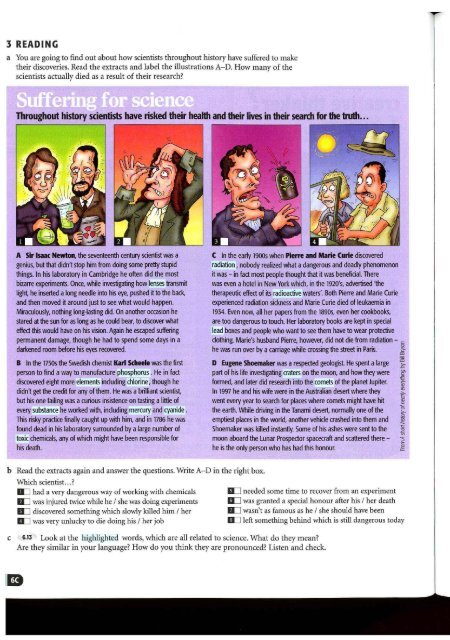Upper-intermediat 5tudenf Book
You also want an ePaper? Increase the reach of your titles
YUMPU automatically turns print PDFs into web optimized ePapers that Google loves.
3 READING<br />
a You are going to find out about how scientists throughout history have suffered to make<br />
their discoveries. Read the extracts and label the illustrations A-D. How many of the<br />
scientists actually died as a result of their research?<br />
Throughout history scientists have risked their health and their lives in their seard! for the truth ...<br />
A Sir Isaac Newton, the seventeenth century scientist was a<br />
genius, but that didn't stop him from doing some pretty stupid<br />
things. In his laboratory in Cambridge he often did the most<br />
bizarre experiments. Once, while investigating how lenses transm~<br />
light he inserted a long needle into his eye, pushed ~ to the back.<br />
and then moved it around just to see what would happen.<br />
Miraculously, nothing long-lasting did. On another occasion he<br />
stared at the sun for as long as he could bear, to discover what<br />
effect this would have on his vision. Again he escaped suffering<br />
permanent damage, though he had to spend some days in a<br />
darkened room before his eyes recovered.<br />
In the 17505 the Swedish chemist Kart Sdleele was the first<br />
I<br />
person to find a way to manufacture phosphorus. He in fact<br />
discovered eight more elements induding chlorine, though he<br />
didn't get the credit for any of them. He was a brilliant scientist<br />
but his one failing was a curious insistence on tasting a little of<br />
every substance 'he worked ~, induding mercury and cyanide .<br />
This risky practice finally caught up ~ him, and in 1786 he was<br />
found dead in his laboratory surrounded by a large number of<br />
toxic chemicals, any of which might have been responsible for<br />
his death.<br />
C In the early 19005 when Pierre and Marie Curie discovered<br />
radiation, nobody realized what a dangerous and deadly phenomenon<br />
~ was - in fact most people thought that ~ was beneficial. There<br />
was even a hotel in New York which, in the 1920's, advertised 'the<br />
therapeutic effect of ~ radioactive waters'. Both Pierre and Marie Curie<br />
experienced radiation sickness and Marie Curie died of leukaemia in<br />
1934. Even now, all her papers from the 18905, even her cookbooks,<br />
are too dangerous to touch. Her laboratory books are kept in special<br />
lead boxes and people who want to see them have to wear protective<br />
clothing. Marie's husband Pierre, however, did not die from radiation - ~<br />
he was run over by a carriage while crossing the street in Paris. l<br />
D Eugene Shoemaker was a respected geologist He spent a large<br />
part of his lije investigating craters on the moon, and how they were<br />
formed, and later did research into the comets of the planet Jup~er.<br />
g><br />
t<br />
In 1997 he and his wije were in the Australian desert where they -€went<br />
every year to search for places where comets might have hit ~<br />
the earth. While driving in the Tanami desert. normally one of the ~<br />
emptiest places in the world, another vehicle crashed into them and<br />
Shoemaker was killed instantly. Some of his ashes were sent to the ~<br />
moon aboard the Lunar Prospector spacecraft and scattered there - '<<br />
he is the only person who has had this honour. ~<br />
'CD<br />
E<br />
j<br />
b Read the extracts again and answer the questions. Write A-D in the right box.<br />
Which scientist. .. ?<br />
D:J had a very dangerous way of working with chemicals<br />
fIJ was injured twice while he / she was doing experiments<br />
II] discovered something which slowly killed him / her<br />
IlJ was very unlucky to die doing his / her job<br />
IlJ needed some time to recover from an experiment<br />
iii] was granted a special honour after his / her death<br />
D:J wasn't as famous as he / she should have been<br />
iii] left something behind which is still dangerous today<br />
C<br />
6.13 ' Look at the highlighted words, which are all related to science. What do they mean?<br />
Are they similar in your language? How do you think they are pronounced? Listen and check.<br />
lIB


